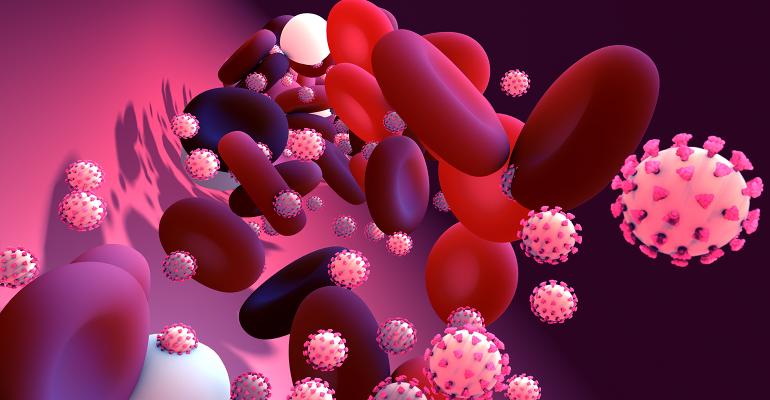Over the last year and a half, the pandemic has shown a remarkable rise in thrombosis (blood clots blocking blood vessels) in relation to the COVID-19 infection. It raised many questions about anticoagulation treatment indications within and outside the hospital. Some countries were using aspirin to reduce the risk of thrombosis, while some others were using oral anticoagulants, which was causing a bleeding accident due to overuse.
At Medlab Middle East, Dr Kayane Mheidly, Consultant Haematology, Clemenceau Medical Center, Dubai, UAE, discussed the risk factor of thrombosis with COVID-19. She shed light on the physiopathology of thrombosis, how it can be prevented, and which patients require anticoagulation.
In an interview with Daily Dose, she highlighted: "I discussed several important points. Haematological manifestations of the COVID-19 infection are various. The most frequent are thrombocytopenia and lymphopenia. There were also some cases of aplastic anaemia and activation of macrophages caused by COVID-19. In our hospital, we had the case of an elderly patient with rheumatological disease with pancytopenia and severe infection, she developed a secondary hemophagocytic lymphohistiocytosis syndrome and, unfortunately, she passed away due to severe infection.
“I also spoke about vaccination and complications post-vaccination, notably atypical thrombosis such as thrombosis and the recent observation about cerebral thrombophlebitis divided fluid etc."
However, she stressed that vaccination is recommended for all patients and that the benefits of vaccination outweigh the risk. For instance, the immunosuppressed population is at high risk of catching severe COVID-19, and it's better to vaccinate these patients. For patients at an increased risk of thrombosis, physicians can manage the choice of vaccine and suggest which vaccination is the safest. The International Society of Thrombosis and Haemostasis also recommends that all patients should be vaccinated.
Dr Mheidly explained that the risk factor of thrombosis increases with age, inflammation for a patient with malignancies, post-surgery, with reduced mobility, pregnancy, use of oral contraception, hormonal replacements, history of thrombosis in the family. The most frequent type of thrombosis is deep vein thrombosis (DVT) and pulmonary embolism. The other types of thrombosis are rare such as splanchnic vein thrombosis (SVT)and cerebral veins thrombosis

Dr Kayane Mheidly
Impact on blood safety
Dr Mheidly said that blood donors have become quite rare due to the pandemic as people are afraid to go to the hospital and give blood. However, some COVID-19 patients have anaemia and thrombocytopenia, which has increased the need for blood transfusions.
When asked about the quality considerations that need to be kept in mind, she said that the hospital staff needs to ensure those blood donors are not infected. Blood banks should ask donors to fill out questionnaires about details such as if the patient has fever etc. If the donor is symptomatic, the blood bank should wait until they are asymptomatic before taking blood.
"COVID-19 has taught us a lot about technology," she said. "We held a lot of virtual meetings and virtual scientific workshops. It helped us, doctors, to have a continuous learning process.
“Moreover, due to COVID-19, we learnt a lot about other diseases and their interaction with this disease. It was a good learning process.”
She concluded: "My message is for people to please take the vaccination to stop the pandemic. People should continue to take care and stay safe by practising social distance, putting their masks on and washing their hands."
The article was published in Arab Health Daily Dose Day 1. Read all the issues here.

